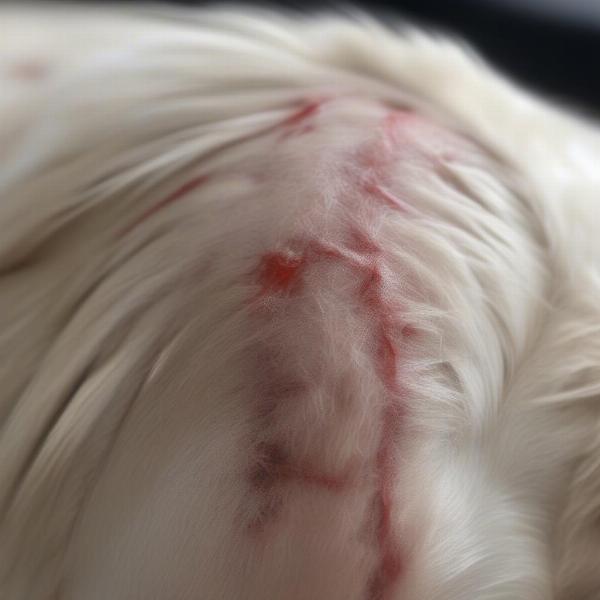Spider bites on dogs can be tricky to identify, often mimicking other skin irritations. Knowing what to look for can save your furry friend from potential complications. This article will guide you through the signs, symptoms, and necessary actions to take if you suspect your dog has been bitten by a spider.
Recognizing a Spider Bite on Your Dog
Identifying a spider bite relies on close observation and understanding the potential reactions. While a definitive diagnosis requires veterinary expertise, being aware of common signs can help you act quickly. Look for redness, swelling, or a raised lesion at the bite site. Some dogs might exhibit pain or discomfort, manifested through licking, scratching, or whining. More severe reactions can include lethargy, vomiting, fever, muscle tremors, and even paralysis, particularly with venomous spiders like the black widow or brown recluse.  Spider bite on a dog showing redness and swelling
Spider bite on a dog showing redness and swelling
Types of Spiders and Their Bites
Not all spiders are created equal. Some, like the common house spider, pose little threat, while others, like the black widow and brown recluse, pack a venomous punch. Black widow bites can cause muscle pain, cramping, and difficulty breathing. Brown recluse bites often result in a necrotic lesion, where the tissue around the bite dies. If you live in an area known for venomous spiders, vigilance is key.
What to Do if You Suspect a Spider Bite
If you suspect your dog has been bitten by a spider, the first step is to remain calm. Carefully examine the area, noting any visible signs. If possible, try to identify the spider, even a photo can be helpful. Contact your veterinarian immediately. They will guide you on the next steps, which might include bringing your dog in for examination and treatment. Time is of the essence, especially with venomous bites. Do not attempt to treat the bite yourself. Home remedies can sometimes worsen the situation.
Preventing Spider Bites in Dogs
Minimizing your dog’s exposure to spiders can significantly reduce the risk of bites. Regularly clean and vacuum your home, paying attention to corners, crevices, and storage areas. Keep woodpiles and other debris away from the house, as these can attract spiders. When outdoors, avoid letting your dog roam in tall grass or areas with dense vegetation. Regularly check your dog’s coat and skin, especially after they’ve been in potential spider habitats.
When to Seek Immediate Veterinary Attention
Certain symptoms warrant immediate veterinary attention. These include difficulty breathing, muscle tremors or paralysis, vomiting, fever, or a rapidly spreading lesion. Even if the symptoms seem mild, it’s always best to err on the side of caution and consult with your veterinarian. They can accurately assess the situation and provide the appropriate treatment.
FAQ
- What are the most common signs of a spider bite on a dog? Redness, swelling, pain, and licking or scratching at the bite site.
- Are all spider bites dangerous to dogs? No, most spider bites are harmless. However, bites from venomous spiders like the black widow or brown recluse can be serious.
- What should I do if I find a spider on my dog? Carefully remove the spider without squeezing it and try to identify it if possible.
- Can I treat a spider bite on my dog at home? No, always consult with your veterinarian before administering any treatment.
- How can I prevent my dog from getting bitten by a spider? Keep your home clean, avoid areas with dense vegetation, and regularly check your dog’s coat and skin.
- What are the long-term effects of a spider bite on a dog? In most cases, there are no long-term effects. However, severe bites can cause tissue damage or other complications.
- How can I tell the difference between a spider bite and other skin irritations? A definitive diagnosis requires veterinary expertise. Look for signs specific to spider bites such as two small puncture wounds.
ILM Dog is your trusted resource for all things dog-related. We offer expert advice on dog breeds, health, training, nutrition, grooming, and much more. From puppy care to senior dog care, we’ve got you covered. For further information and guidance on dog care, visit our website at ILM Dog or contact us at [email protected] or +44 20-3965-8624.